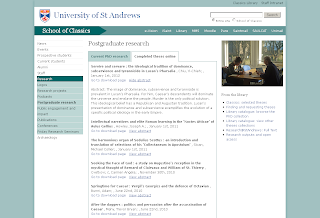Intern's log, stardate 12/07/2013: For the past six weeks I have been an intern here in the Repository Team, a post which I obtained through the St Andrews Summer Internships Scheme. It has been a busy time, and a description of all of my activities in detail would be far too lengthy, but I hope this summary illuminates some of the insights I have gained into the library’s operation. Most students, as I was myself, will only be familiar with the public areas upstairs, but this is only the tip of a large, multifarious iceberg. Think pre-global warming, with plenty of space for polar bears sipping a generic, unbranded coke.
The Repository Team works in what I have fondly come to think of as the ‘underbelly’ of the library, and deals with providing digital access to University research publications and theses. One of my primary tasks has been adding thesis content to Research@StAndrews:FullText, a great resource which I hadn’t really heard of or used before I started investigating the job description, but I will certainly be using it now! It’s a great database of content produced by St Andrews, including research output, current theses and retro theses which have been requested through EThOS –another handy research tool. I have added over 200 pieces of content whilst I’ve been here, a task which has included creating coversheets for uniformity, finding metadata and subject headings for increased access, and adding links to the catalogue for visibility. Updating the collections pages also gave me an opportunity to use HTML and exercise an eye for detail to spot dead links and poorly formatted paragraphs in over one hundred pages. As a rather pernickety person I have found it all to be very enjoyable, and through reading the abstracts of theses I've learnt about diverse topics such as dolphins and lasers - a combination of knowledge which I promise to use only for the good of mankind.
On a serious note, although the classification work may seem fiddly, when you realise the sheer scale of the content which the library holds then you see it is thoroughly necessary. My desk is in-between the acquisitions, cataloguing, and processing departments, and hundreds of items pass through here every week, as well as the digital content which the library is constantly acquiring. It's important we know what it is and where it is, otherwise the utility of the library would completely break down - imagine if Wikipedia had no search function, and you could only press the 'random article' button to try and find that information you need! All of this unseen work is really what makes the library function so well for you as a user, and until SAULCAT gains sentiency (estimated for 2079), next time you pull up a record be sure to think about the work that goes into acquiring, cataloguing and processing your item.
Another strand of my work here has been investigating who funds the research which occurs at St Andrews. Changes in regulation mean that many funding bodies, such as the RCUK, EU, and Wellcome Trust, require that research which they have funded is made accessible online. Open Access is still rapidly evolving, so it was exciting to be a part of something which is changing as you work on it, and my main task has been to detail the research funded by the RCUK and Wellcome Trust over the last year, so that we can identify things we may be able to add to PURE (our research portal). I've also had to do some investigation to track down authors of theses which we wish to upload, some of whom left over forty years ago. This made me feel rather like I was on Heir Hunters- it's on after Jeremy Kyle but before Bargain Hunt - where they track down long lost relatives. Nobody I found got a huge windfall, but I think it's nice for people to know that their research is still wanted after so long, and that it will always have a home at the University.
The library has really made a great effort to make sure that I got the most out of my time here, and so I've been lucky enough to visit lots of people in different departments. Again, it's too much to detail it all, but I would like to thank all of the people I've seen who have given so generously of their time, which quite clearly has so many demands on it already. As a book-lover and historian/classicist I've really enjoyed seeing some of the treasures of Special Collections, as well as the gifts and bequests which the library is lucky enough to receive. It has also been interesting to follow material from ordering to shelving, learning about how it is acquired and then the various processes it goes through. The overwhelming impression has been that there really is more to the library than you would imagine, in terms of scale and operations, and that the staff work very hard to make it a user-friendly experience.
So, have I been persuaded that my future career lies in librarianism? Well, as a person who can't decide on a cake (as happened this morning) let alone a career, I am not entirely sure. What I will say is that I've learnt many transferable skills (necessary buzzwords for an arts student), both library-related and more general things to do with the work environment and myself, which I know will benefit me immensely in the future. I would encourage anybody thinking of applying for an internship with the library next year to do so - you're in safe hands!
Heather Curtis (Guest blogger & intern)


























